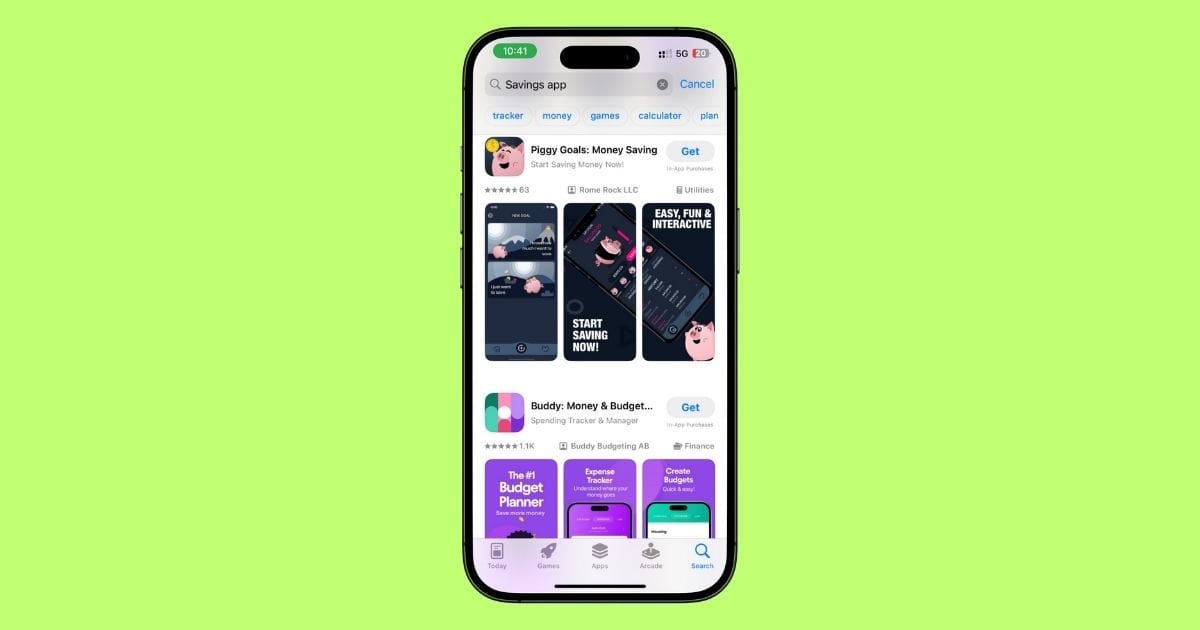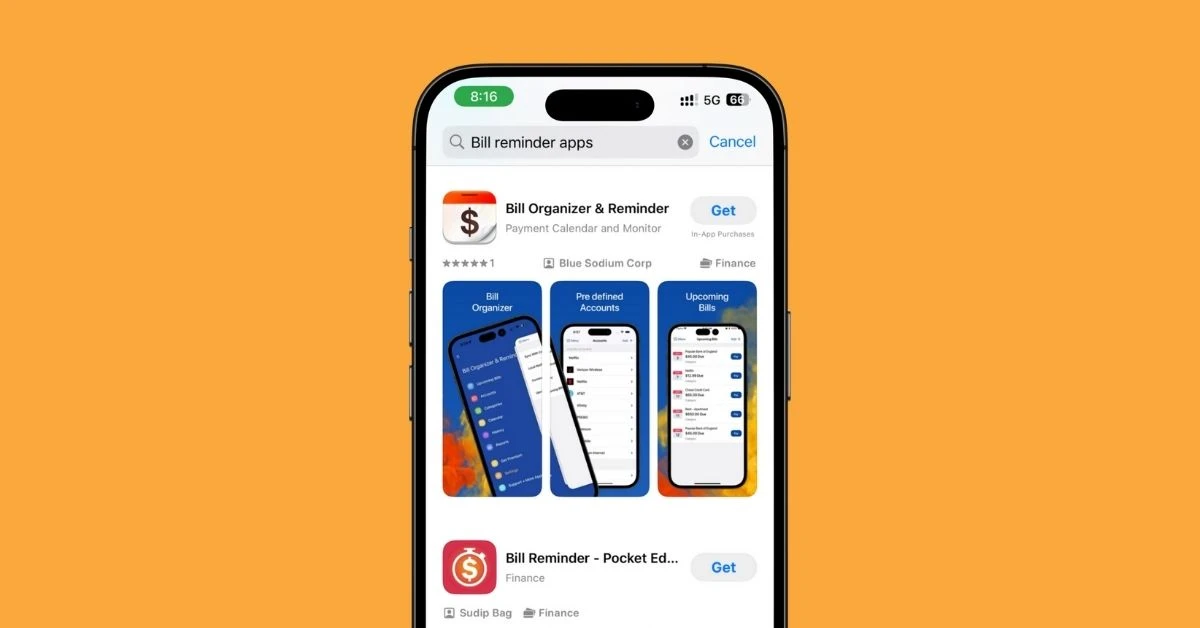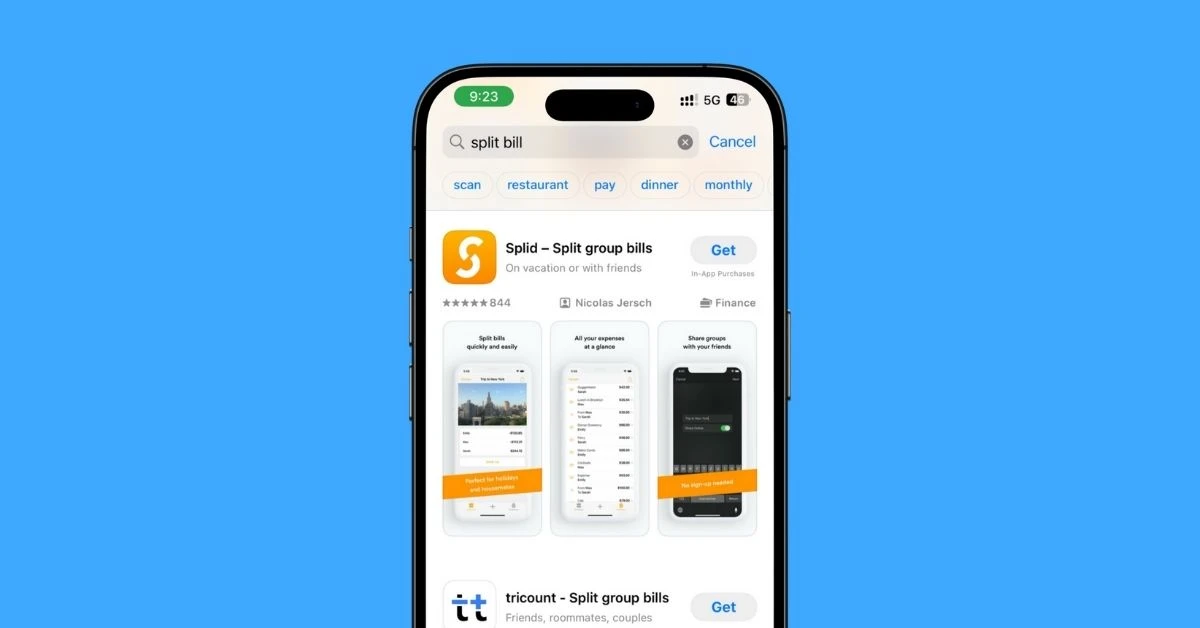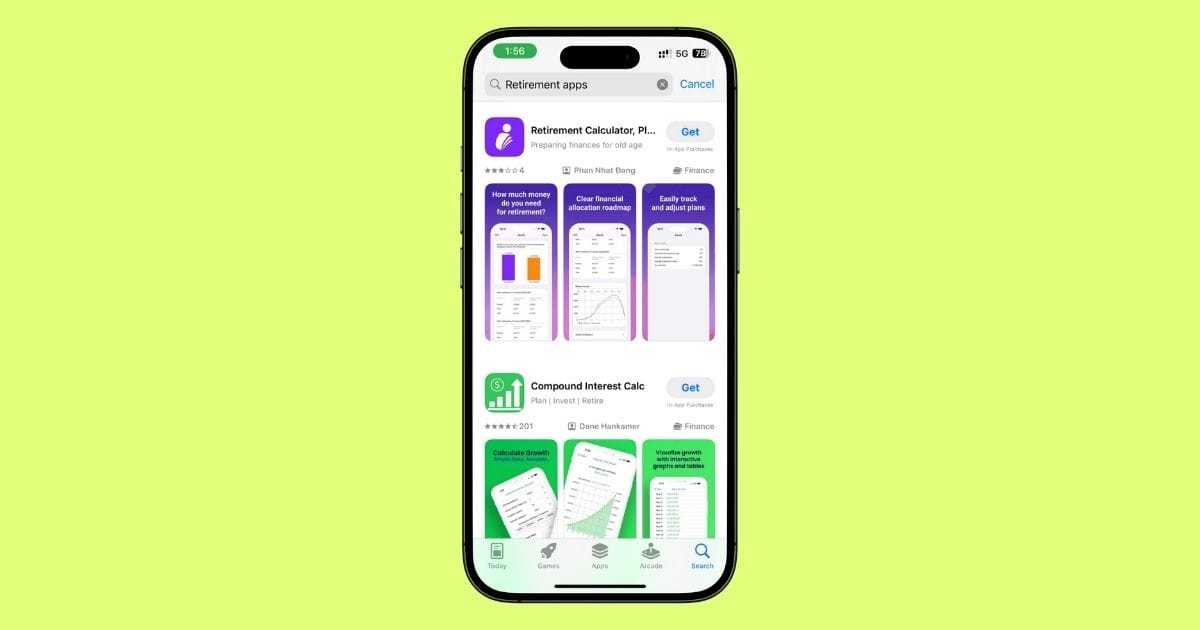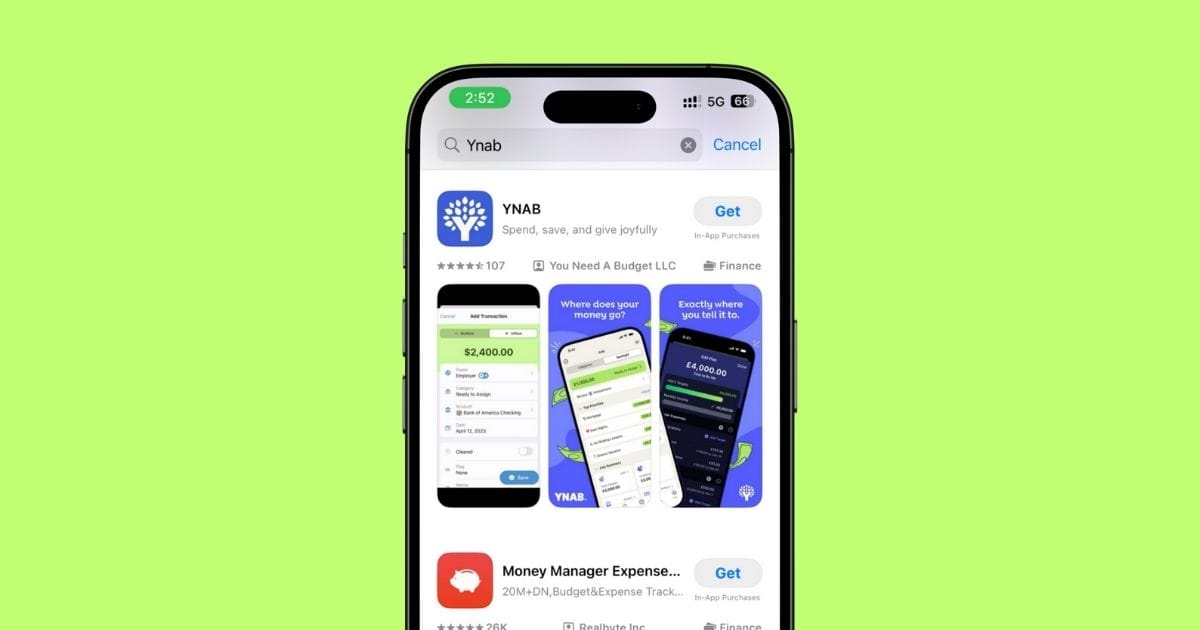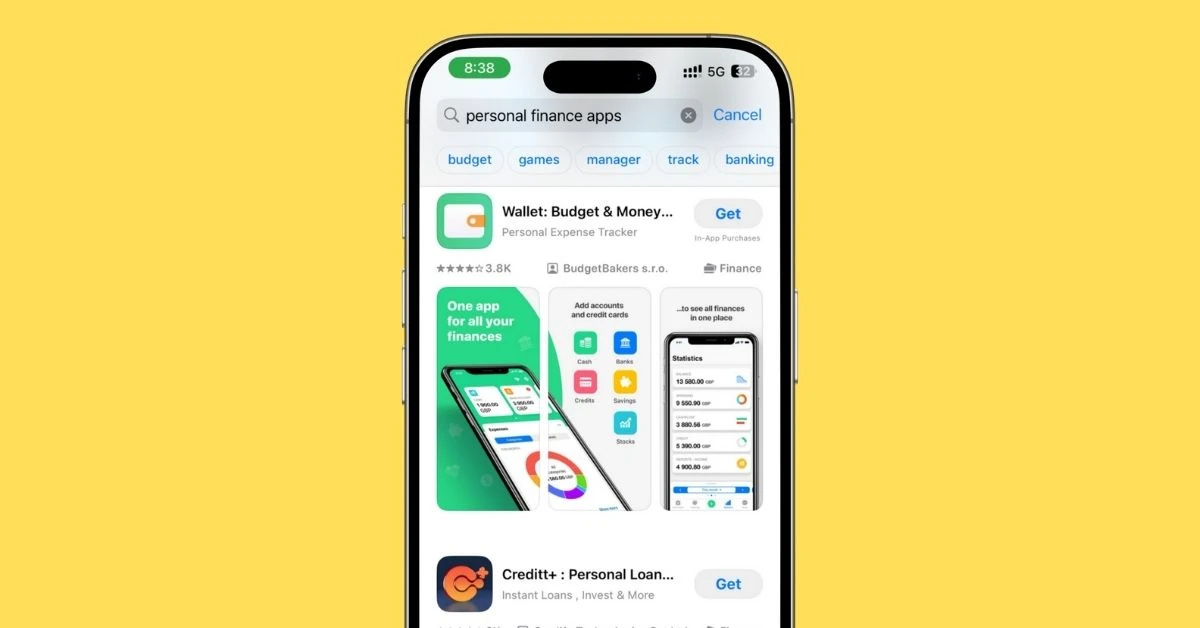7 Best Apps to Monitor Your Credit Report (and Get Alerts)
Look, keeping an eye on your credit isn’t just for “finance people.” It’s for all of us.
You know how fast someone can mess with your identity these days? Or how easy it is to miss something on your credit report that tanks your score?
That’s why I want to talk about these apps. Not to sell you on anything fancy. Just real tools you can grab on your phone, so you know exactly what’s going on with your credit.
You’ll get alerts if someone opens an account in your name. You’ll see score changes before they surprise you.
And honestly… You’ll sleep better knowing you’re watching your back.
So let’s go through the best apps to monitor your credit report and get those alerts.
Pick the one that feels right for you and make sure no one’s messing with your money behind your back.
1. Credit Karma – Best for Free Alerts
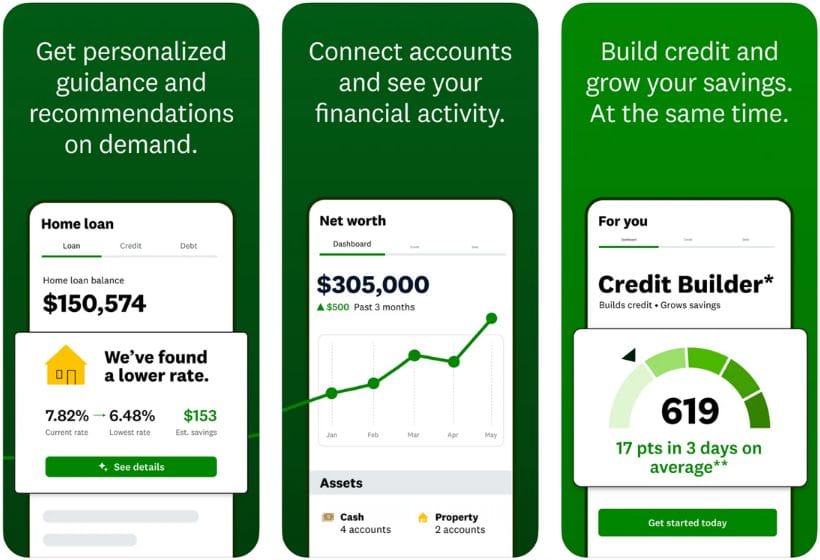
Pros
- Free to use
- Alerts for credit changes
- Reports from two bureaus
Cons
- Ads for credit cards and loans
- Doesn’t show Experian report
You know Credit Karma’s the one everyone’s heard about—and honestly, there’s a reason.
It’s free. No weird trial that charges you in 7 days. You sign up, verify your identity, and you’re in.
What I really like about it… You actually get alerts.
If someone opens a new account in your name or there’s a hard inquiry, you’ll know fast. That’s the kind of thing you don’t want sneaking up on you.
Credit Karma gives you reports and scores from TransUnion and Equifax.
So it’s not all three bureaus, but two out of three is still pretty good for something that doesn’t cost a dime.
I won’t lie—they make money pushing credit cards and personal loans.
You’ll see offers everywhere in the app. Just ignore them if you’re not looking. But the core service—the monitoring, the alerts, the weekly updated scores—is solid.
It’s also super easy to understand.
Even if you’re not a “money person,” you’ll see your score right on the home screen, with clear explanations for why it’s going up or down.
And the credit report section lets you see your accounts, balances, payment history—stuff you want to check if you’re worried about fraud or errors.
If you want something free, easy, and reliable for staying on top of your credit, Credit Karma is a no-brainer. It’s one of those apps that just sits on your phone quietly until you need it—and when you get that alert, you’ll be glad you had it.
2. Experian – Best for Official Reports
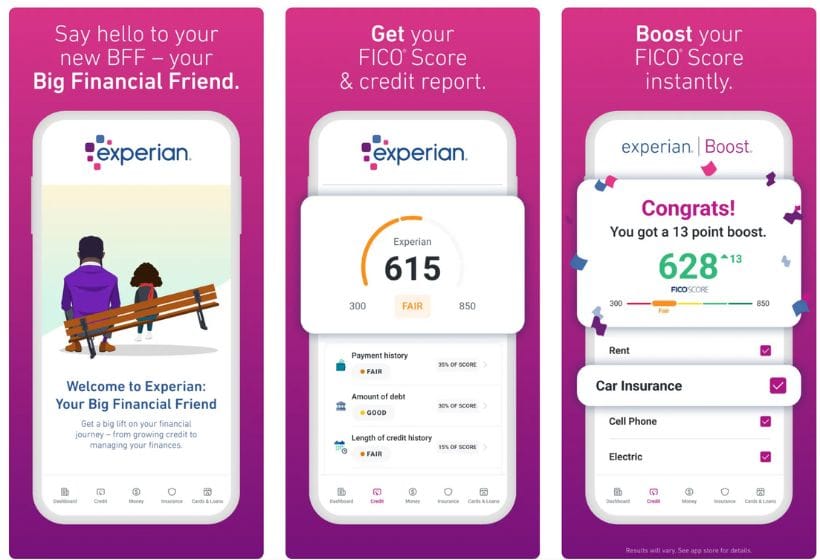
Pros
- Free FICO Score
- Official bureau data
- Real-time alerts
Cons
- Only Experian report for free
- Upsells for premium features
Experian’s the real deal because, well, it’s actually Experian.
You’re getting your credit info straight from one of the big three bureaus. No middleman. That alone is a big comfort for a lot of folks.
Right out of the gate, you get your Experian credit report and FICO Score for free. Not one of those made-up scores or an approximation.
It’s the same FICO Score most lenders actually use. That’s something a lot of free apps don’t give you.
You’ll also get alerts when something changes on your Experian report. New accounts, hard inquiries, changes to balances—it’s all there.
If you’re the type who wants to know the second something’s up, this app’s got your back.
Now, they’re gonna try to sell you on the premium plans.
Those unlock 3-bureau reports and extra features like identity theft insurance. It’s not cheap, but if you want really deep monitoring and you’re serious about protecting your credit, it might be worth looking at.
But honestly… Even the free version is solid if you’re cool with just keeping tabs on Experian.
I think of it like this: if you want something official, you go straight to the source. No fluff, no guessing. It’s not the fanciest app out there, but it’s dependable.
And if you’re only going to monitor one bureau for free, Experian is a strong choice.
If you want to keep things simple, trustworthy, and straight from the credit bureau itself, Experian’s app is one you should definitely consider.
3. myFICO – Best for 3-Bureau Scores
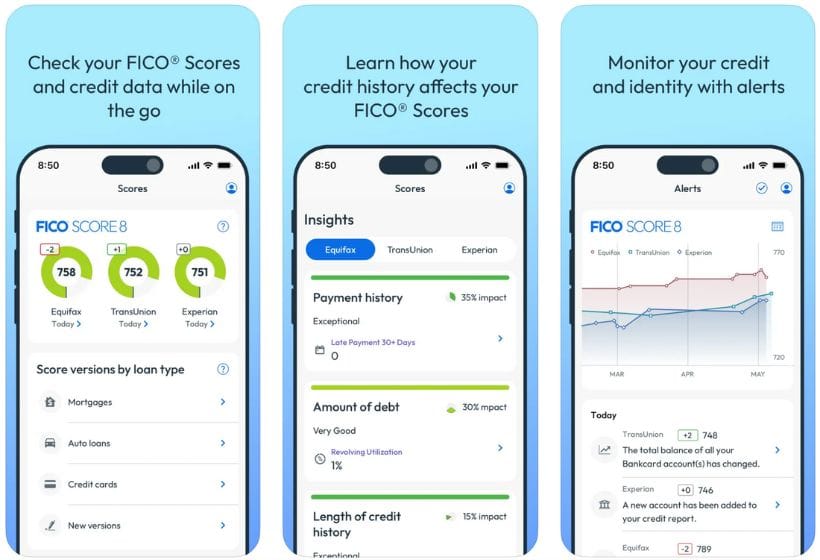
Pros
- True FICO Scores
- 3-bureau reports
- Detailed alerts
Cons
- Paid subscription
- Can be pricey
Alright, let’s be real here—myFICO isn’t the cheapest option on this list.
But if you want serious credit monitoring, this is the one you turn to. It’s built for people who want accuracy and detail over anything else.
First off, you get your FICO Scores from all three bureaus—Experian, Equifax, and TransUnion. And I mean actual FICO Scores, the same ones lenders check when you apply for a mortgage, car loan, credit card—whatever.
Most free apps only give you VantageScores or one bureau’s data. If you want the gold standard… This is it.
What I really like is the detail in the alerts. It doesn’t just say “your score changed.” It breaks down why. New account? Big balance shift? Inquiry? You’ll know exactly what’s going on.
That level of transparency is what you want if you’re trying to catch fraud early or just stay on top of your credit.
Of course, it’s a paid service. It’s not cheap.
But for some folks, that’s worth it for peace of mind, especially if you’re planning something big like buying a house or refinancing.
You want to know there are no surprises on any bureau’s report.
Honestly, myFICO is for the people who want to do credit monitoring right. No half-measures.
If you’re okay paying for it, you’ll get some of the best credit tracking around.
It’s like going from a free security camera to a 24/7 professional monitoring service. Depends what you need, but if you want the best, this is it.
4. Capital One CreditWise – TransUnion-based FICO Score 8
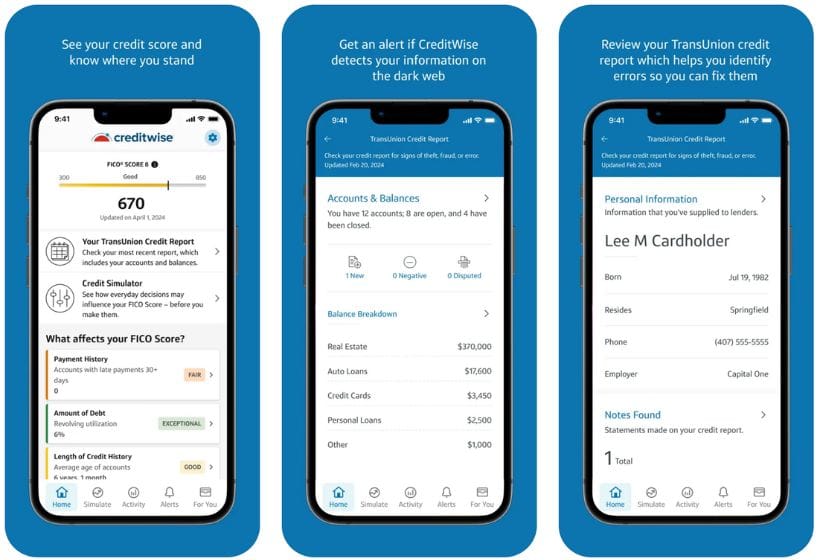
Pros
- Totally free
- Monitors two bureaus
- Solid alerts
Cons
- Ads for credit cards
- Only TransUnion score
CreditWise is honestly one of the easiest free credit monitoring apps to recommend.
You don’t have to be a Capital One customer to use it, which is nice. Just download it, sign up, and you’re set—no payment info required, no sneaky trial that bills you later.
What I like most… It covers both TransUnion and Experian for monitoring.
That means you’ll get alerts if something changes on either report—new accounts, hard inquiries, fraud attempts. For a free app, that’s really solid coverage.
Your credit score in the app is based on TransUnion.
It’s your TransUnion-based score that updates regularly, so you can keep tabs on how you’re doing. That part’s super straightforward.
And if you’re trying to improve your credit, watching those changes over time is actually motivating.
Of course, they’re going to show you Capital One credit card offers here and there. That’s how they make their money.
But they’re not obnoxious about it. You can just ignore the offers and stick with the free monitoring if that’s all you need.
It’s also really easy to use.
The app is clean and simple—no weird menus, no confusing graphs. It just tells you what you need to know: your score, your alerts, your report details.
That’s exactly what most people want in a credit monitoring app.
In short, if you’re looking for a free, reliable way to keep an eye on your credit with coverage for both TransUnion and Experian, CreditWise is a no-brainer.
5. Credit Sesame – Best for free tracking
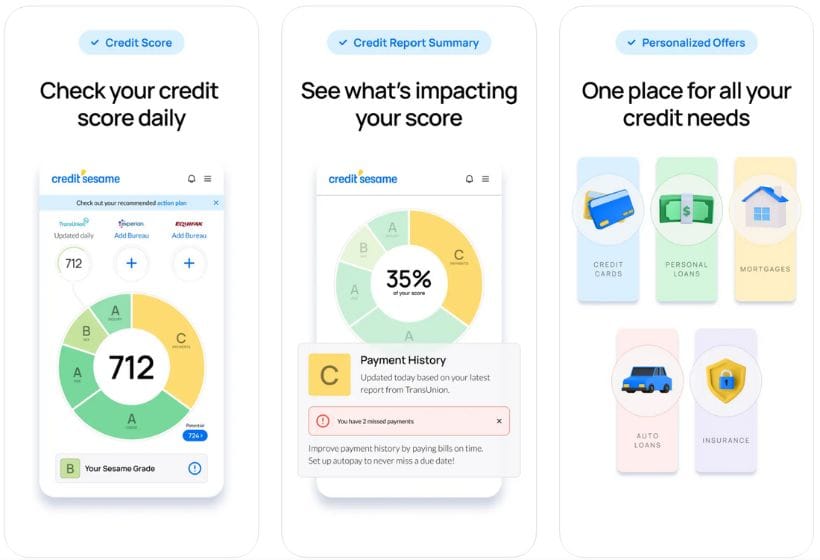
Pros
- Free credit score
- Alerts for changes
- Upgrade for 3-bureau coverage
Cons
- Free plan is single-bureau
- Ads and offers inside
Credit Sesame is one of those apps that’s been around forever, and for good reason—it does what most people need for free without too much hassle.
If you’re looking for a starter option to keep tabs on your credit, this is an easy pick.
With the free plan, you get your TransUnion credit score (VantageScore) and monitoring for changes.
If there’s a new account, a hard inquiry, or a missed payment, it’ll let you know. And those alerts matter, because catching something weird early can save you a ton of trouble.
I like that the sign-up is simple. No credit card needed, no sketchy upsells at the start.
They will show you credit card and loan offers in the app (that’s how they make money), but you can ignore them. It’s not in your face constantly.
Now, the free version only monitors TransUnion.
That’s something to keep in mind. If you want full 3-bureau monitoring, they have paid plans that add Equifax and Experian, plus identity theft insurance.
Not everyone needs that, but if you’re really serious about watching all three reports, it’s there.
What I also appreciate is the extras they throw in.
You’ll get tips on how to improve your credit, simulators to see what happens if you pay off debt, and even suggestions for products that might save you money.
Sure, they’re making money if you sign up for something, but the guidance is actually useful if you want it.
So, if you want something free, easy to use, and solid for basic credit monitoring, Credit Sesame is a great place to start.
6. Chase Credit Journey – It’s Based on Experian’s Data
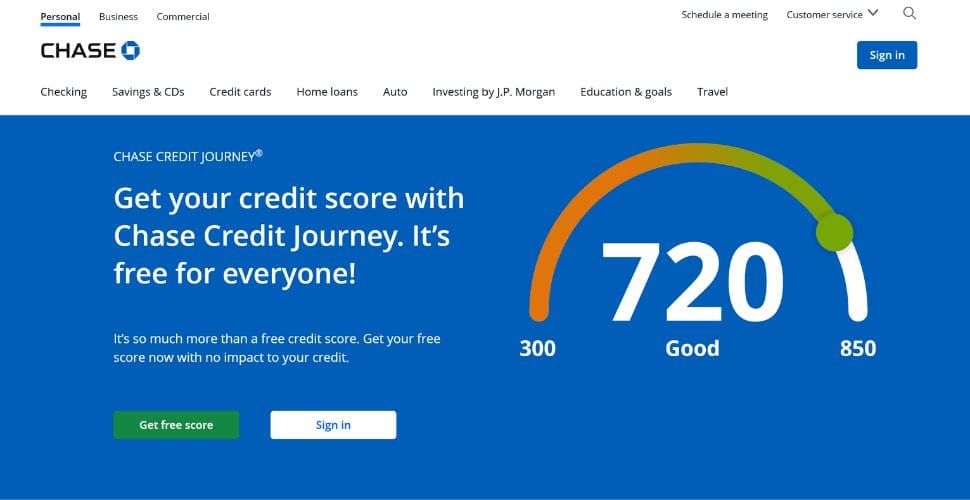
Pros
- Totally free
- Weekly score updates
- Fraud and credit alerts
Cons
- Only Experian data
- Credit card promos inside
Chase Credit Journey is one of those underrated gems that a lot of people skip over because they think you need a Chase account. But you don’t.
Anyone in the U.S. can use it for free—even if you’ve never banked with Chase a day in your life.
It’s powered by Experian, which means the credit score you see is based on Experian’s data.
You get weekly updates on your score, which is plenty for most people. No need to sit there refreshing it every day like you’re checking Instagram.
Once a week keeps you on top of any changes without driving you nuts.
What I really like about Credit Journey is the alerts.
If someone opens a new account in your name, there’s a hard inquiry you didn’t expect, or anything fishy pops up on your Experian report, you’ll know about it fast.
That’s the kind of early warning system everyone should have these days.
The app itself is clean and simple. Chase doesn’t overcomplicate it.
Yes, you’ll see offers for Chase credit cards—of course, you will, it’s their app.
But they’re not shoving them in your face every two seconds. It’s easy to ignore if you’re not in the market.
Honestly… This is a solid, zero-cost way to keep an eye on your credit health.
If you want something trustworthy, easy to set up, and powered by one of the big banks in the U.S., Chase Credit Journey is a no-brainer.
7. WalletHub – Best for Daily Monitoring
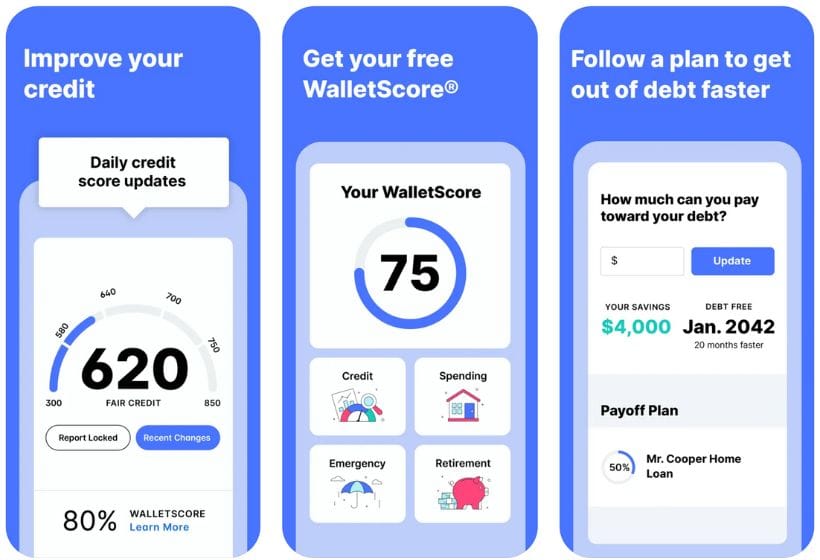
Pros
- Free daily score updates
- Instant credit alerts
- Easy to use
Cons
- Only TransUnion data
- Ads for credit products
WalletHub is one of those apps that just feels like it’s built for people who want to really keep an eye on things, like, every day if you want.
A lot of apps update your score weekly or monthly. But WalletHub updates daily. Seriously. If you’re the type who likes watching every little change, this is your app.
The free plan gives you your TransUnion credit score (VantageScore) and a full credit report summary.
It also comes with instant alerts. If there’s a new account, a hard inquiry, or something shady happening, you’ll get a heads-up right away.
That’s a big deal for spotting identity theft early or just staying on top of your credit health.
It’s also super easy to use. The dashboard is clean, and the info is straightforward. No confusing graphs that make you feel like you need a finance degree.
Just your score, your report details, and any alerts you need to see.
Of course, they have ads and offers inside.
They’ll recommend credit cards, loans, ways to save money—that’s how they make a buck.
But they’re not crazy aggressive about it. You can ignore the offers and just use the monitoring for free.
One thing to know: it only uses TransUnion data.
You won’t see Equifax or Experian in there. For a free app, that’s not a dealbreaker, but it’s good to know going in.
Honestly… If you want daily updates and instant alerts without paying a dime, WalletHub is hard to beat.
My Final Take
Look, keeping an eye on your credit isn’t optional anymore.
Too many scams, too many surprises.
It’s one of those “adulting” things that actually matters. But here’s the good news—you don’t have to pay a fortune or be some financial wizard to do it right.
These apps make it simple.
They’ll send you alerts if anything changes. They’ll show you your score so you know where you stand. They’ll help you spot fraud before it spirals into a nightmare.
My advice… Don’t overthink it.
Pick the one that feels right for you.
The best app is the one you’ll actually use. Even just one alert at the right time can save you money, stress, and a whole lot of hassle.
If you’re already using one of these, or you have a favorite I didn’t mention, let me know. I love hearing what’s actually working for people.
FAQs
What is the best free app to monitor my credit?
Honestly, Credit Karma and CreditWise are solid picks if you want totally free options. They give you real alerts, decent score updates, and don’t charge you a dime.
Do credit monitoring apps hurt my credit score?
Nope. Checking your own credit through these apps is a “soft inquiry.” It doesn’t ding your score at all. It’s like looking in the mirror—you’re not changing anything, just seeing what’s there.
Is it worth paying for credit monitoring?
It can be. Free apps are great for basic alerts, but paid plans (like myFICO) usually cover all three bureaus and add extras like ID theft insurance. If you want the full picture or extra protection, it might be worth it.
Do I really need credit monitoring?
Honestly? Yeah. Fraud and identity theft happen all the time. Even if you don’t think anyone’s coming for your info, one data breach can change that. Monitoring helps you catch it early.
Can I monitor all three bureaus for free?
Not usually. Most free apps cover one or two bureaus. If you want true 3-bureau coverage, you’ll usually need to pay for it.
What’s the difference between a credit score and a credit report?
Your credit report is the full record—accounts, balances, history. Your credit score is a number calculated from that report to show how risky (or safe) you are as a borrower.

